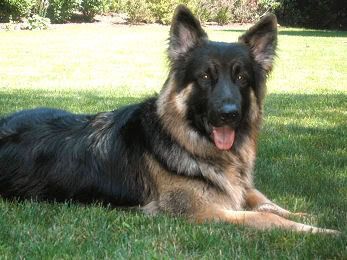I was suggesting to the OP maybe she has the typical teenager and her 15 year old goes out with friends, talks on her cell phone, goes to school, IM's everyone, does homework, maybe has a boyfriend, maybe has a job, etc. You get the picture. She's busy being a normal teenager and maybe, just maybe her dog is not her number one priority.
Um, Judy, you just described me at 15!

Except for back when Moka was a young puppy, she wasn't my number one priority. Of course I made sure she got walked, fed, trained and played with, but my priorities were school and friends.
There were plenty of times when I was just too busy to walk her or feed her (exams, away on school trips or with friends) and my family (mother) would take over. I was her main handler and caregiver of course (even at 10 years old), but my mother was there to take over with walks and feeding when I was too busy being a "teenager".
Even without the advantage of being "extraordinary" like your lucky children

, I did a decent job raising and training Moka and it all worked out fine. Like Lovella's 15-year-old, I was more responsible than the average young teen and my parents saw that in me. I'm so grateful to them for respecting that, for believing in my abilities and commitment and for giving me the privilege of having a dog.
I certainly wasn't dedicated to her like I am to my current pup and I don't think there was anything wrong with that. Moka is a family pet and she always got what she needed, every single day of her life, whether from me or from my family.
Isn't that the whole point of a family pet?
As you said, the dog should of course respect the rank of all family members. I just don't think it's fair to Lovella (or her children) to be picked on because she wants a dog "for her kids" when her children aren't old enough to be 100% responsible for the puppy's care.
Of course they're too young for that, and clearly she's not expecting them to be in charge of the puppy's care. She's doing her research and working at this, isn't she? Sounds very responsible and smart to me

I don't think it's a problem at all (certainly not "crazy") that Lovella wants this new pup to be more attached to her younger children. It's a given of course that EVERYONE in the family should rank higher than the dog and that she should supervize the little ones' interaction with the pup at all times for everyone's safety.
Lovella, if you continue to learn the techniques for yourself as you're doing already (good job btw!), you can teach the children and have them be the main handlers for the puppy. They can have the pup tethered to them in the house (make sure you're around to show them what to do when the puppy needs to go out or does something wrong).
They can be the ones to play with, walk and socialize the pup (again, you should always be there).
They can feed the puppy its meals and make it sit for its food (again, supervize and coach them).
They can also be the ones to start marker training with treats.
Lovella, if you do all that, then yes, the new puppy will become more attached to your younger children than to you or the rest of the family. You can even limit the puppy's playing with other family members so the puppy goes to the little ones for its play and affection.
Ed describes this procedure for raising a working puppy. Even though yours will just be a pet, the principle is the same. You teach the dog, starting at a young age, who to look to for play, affection and food. This is all up to you to decide.
Are you sure this is what you want? If you go through with this and your younger children eventually lose interest, the puppy will still look to them for its play and affection needs. If you are sure, and are willing to take on the responsibility and time to supervize and make this all happen, then I say go for it!
You can take over part of either dog's care (feeding, walks) when your children are too busy with school, life etc. and could use the help. That shouldn't affect their relationship with the dogs.
I think you're being very responsible in researching this instead of just tossing a puppy to young kids and leaving it at that. I think your question is a valid one and that your plan can work.
Richard gave excellent advice on how to get your 15-year-old daughter's dog to warm up to the little ones (the Leerburg videos are extremely helpful, I recommend them!). Because he sees your 15-year-old as his leader, he will follow her lead and will learn to play with the other children if she encourages it.
As for you, you should be a strong pack leader to all the dogs and make it VERY clear in their minds that you will not tolerate any obnoxious or aggressive behaviour displayed to the kids (don't leave this part up to them!! the dog needs to see you intervene strongly on your children's behalf). This includes the older dog.
Your little ones will most likely need your support to maintain their rank (unless the puppy turns out to be an absolute submissive sweet marshmallow of a dog, lol).
Best of luck. It certainly sounds like you have your hands full!

 Previous Topic
Previous Topic Index
Index Next Topic
Next Topic












 Top
Top


 . The OP stated the dog doesn't listen to the teenager so how can she be an effective pack leader? The dog isn't listening on what appears to be a continual basis. See her original first or second post.
. The OP stated the dog doesn't listen to the teenager so how can she be an effective pack leader? The dog isn't listening on what appears to be a continual basis. See her original first or second post. 




